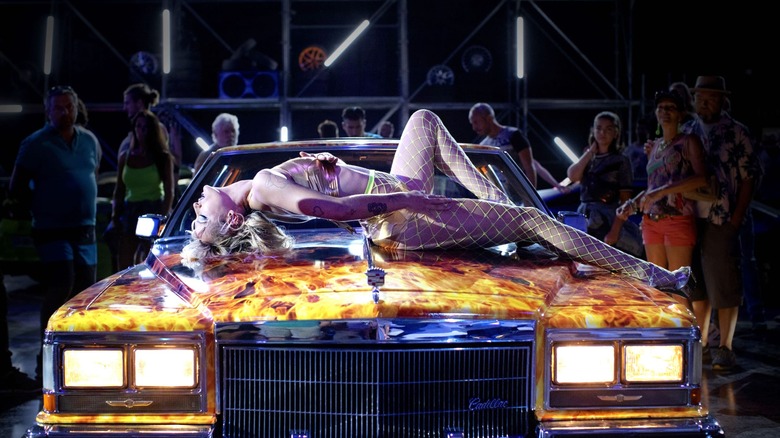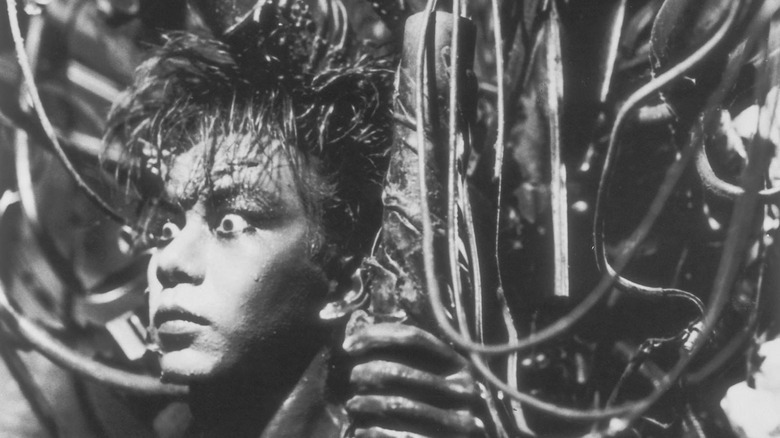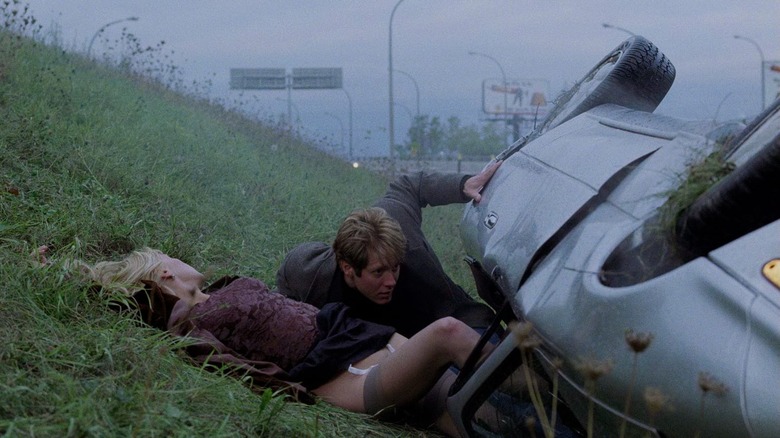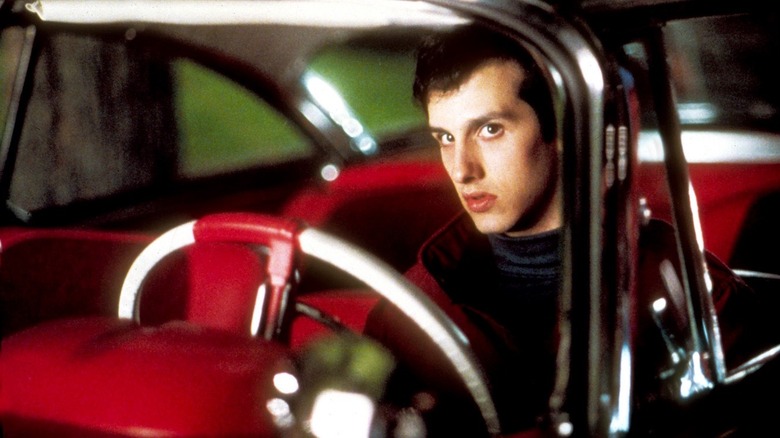8 Movies To Watch After Titane
Julia Ducournau's erotic body-horror thriller "Titane" is a cinematic explosion of genres, themes, and gorgeous visuals. The less you know about "Titane" before seeing it, the better, so stop here if you haven't checked out this shocking film for yourself just yet. Seriously, this is one where you want to go in blind.
So, you've seen "Titane" and now you want more. I don't blame you; controversial and exploitation cinema is my favorite flavor of film. The only problem is that there's nothing exactly like "Titane," because it's so wholly fresh and original, but there are a handful of movies with similar themes, tones, and visuals. Whether it's body horror, mechanical fetishization, or feminine violence, the films listed here all share something in their DNA with "Titane," and they're all guaranteed to knock your socks off.
Tetsuo: The Iron Man
"Tetsuo: The Iron Man" rules. There's a reason it made our Top 15 Japanese Horror Movies of All Time list. The hyper-violent black-and-white 1989 cyberpunk body horror film is a masterpiece of human transformation. "Tetsuo: The Iron Man" was written, produced, directed, and edited by Shinya Tsukamoto. He also stars as the unnamed "metal fetishist."
The metal fetishist is accidentally killed by a businessman, who begins having visions of industrial machinery. Parts of his body begin transforming into metal, starting with a metal spike that protrudes from his cheek and spurts blood. Before long he's half-metal, half-man, and he's having bizarre sexual fantasies about his girlfriend. The psycho-sexual component only amplifies when the businessman's penis turns into a spinning metal drill and he loses control, attacking his girlfriend.
"Tetsuo: The Iron Man" is a bold, shocking film that's earned its place as a classic midnight movie. Like "Titane," the movie focuses on a character who feels more connected to machines than people. Both also have violent transformations, though "Tetsuo" is a bit more fantastical in its approach.
Climax
Just about every entry in the filmography of French-Argentinian director Gaspar Noé has some kind of tie to Ducournau's wild ride, but the two that share the most thematically and visually are "I Stand Alone" and "Climax." While "I Stand Alone" is a challenging father-daughter story that shares threads with the relationship between Alexia (Agathe Rousselle) and Vincent (Vincent Lindon) in "Titane," 2019's "Climax" shares more visual elements and is just more entertaining overall.
There are a number of energetic, throbbing dance scenes in "Titane," starting with the opening car show complete with femme bodies undulating on top of chromed-out hot rods and moving to homoerotic raves among firefighters. "Climax" is one long party sequence that takes place at a dance studio when someone spikes the punch and things get wildly out of control. In addition to a uniquely urban French aesthetic, "Titane" and "Climax" share a violent sexuality punctuated by pulse-pounding musical beats.
Crash
David Cronenberg's "Crash" is a movie about people who fetishize car crashes. Much like Alexia in "Titane," who fetishizes cars so much that she kisses one even though it almost killed her, the protagonists in "Crash" get really horny about automobile accidents. The 1996 film was controversial when it was released, but has gone on to be appreciated more since. In 2019, the NC-17 cut of "Crash" finally got its due with a 4K restoration that debuted at the Venice Film Festival.
In "Crash," James Ballard (James Spader) causes an accident with a car carrying Dr. Helen Remington (Holly Hunter). Dr. Remington's husband is killed, while she and James are severely injured. He discovers that she is sexually aroused by the danger of car accidents and soon starts hanging out with a cult of car-crash fetishists. His wife joins in, and they all spiral into a world of twisted limbs and twisted metal.
Cronenberg's "Videodrome" also shares DNA with "Titane," as the main character Max Renn (James Woods) has a physical transformation similar to Tetsuo or Alexia, but "Crash" is ostensibly a movie about people who get horny for car crashes, and "Titane" is about a violent woman who gets horny for cars. They're both violent, disturbing, and very, very horny.
Possessor
David Cronenberg isn't the only one in his family who makes killer psychosexual body horror. His son, Brandon, dropped onto the scene with his 2012 contagion horror "Antiviral," but he really blew minds with his 2020 body-hopping sci-fi thriller, "Possessor." Andrea Riseborough stars as Tasya Vos, an assassin who uses special technology to inhabit another person's body and complete her missions. Her latest mission has her inhabiting the body of Colin (Christopher Abbott), who is about to marry into a rich and powerful family. Tasya starts to find herself slipping further into her new identity, perhaps feeling more comfort in a male body. There's a twisting narrative about gender and dysphoria at the heart of "Possessor." Tasya and Alexia from "Titane" are two sides of the same coin, representing people with female reproductive organs who don't feel at home in their own bodies.
Like "Titane," "Possessor" is full of burning sexuality, body horror, explosive violence, and surreal, dreamlike visuals. Both are intense experiences from start to finish that feature a female serial killer as the protagonist, but "Titane" does have the advantage of a femme gaze.
Christine
One of the most memorable scenes in "Titane" involves Alexia having passionate, violent sex with a Cadillac. After having a titanium plate put in her head as a child, she has had no real connection to any other humans. Cars, however, she treats with a kind of reverence. Alexia is an outcast, a loner, but with cars, she's powerful.
The 1983 John Carpenter horror film "Christine" is also a love story between a human and a car. Based on the novel by Stephen King, "Christine" stars Keith Gordon as Arnie, a teenage loner who becomes obsessed with a 1958 Plymouth Fury that he names Christine. As Arnie and Christine's relationship grows, Arnie becomes more confident and Christine becomes more bloodthirsty. By the time she's driving herself down the road aflame to Carpenter's killer score, it's already too late.
"Christine" is a silly Stephen King story taken to surprisingly scary places by Carpenter. It's hard to believe a movie about a killer car could be anything other than corny, but "Christine" is a seriously twisted meditation on loneliness, love, and vehicles. Make sure to check it out before Bryan Fuller's reboot!
Baise-Moi
"Baise-moi" is the fiercest expression of femme violence I've ever seen. The 2000 French crime thriller written and directed by Virginie Despentes and Coralie Trinh Thi is basically "Thelma & Louise" taken to its most extreme. Based on the 1993 novel by Despentes, "Baise-Moi" follows Nadine (Karen Lancaume) and Manu (Raffaëla Anderson), two part-time sex workers who feel that they have been completely marginalized by society. After both of them are raped by different men, they decide to team up on a rampage of revenge. The film is considered a part of the "New French Extremity" due to its graphic violence and explicit, sometimes unsimulated sex scenes.
The women's rampage starts stacking up quite the body count, including a random woman at an ATM, some police who stopped their car, and all of the patrons of a swinger's club. When one of the men in the club makes a racist comment to Manu, she uses a gun on him in a horrifyingly sexual way before killing him outright.
"Baise-moi" is vicious and nihilistic and follows two protagonists who are challenging to root for. There's a shared bloodline between the women of "Baise-moi" and Alexia in "Titane," because all of them are sadistic killers with almost no sense of empathy.
Dogtooth
Yorgos Lanthimos' 2009 Greek drama "Dogtooth" is like a cinematic punch to the gut. The film follows a family that lives on a compound in rural Greece. The children are kept ignorant of the outside world, and any words they discover from books are given alternative meanings. They aren't even allowed to watch TV or movies, and they believe that if they misbehave, they will be forced out into the world to die.
In order to help relieve his son's sexual urges, the father begins paying a female employee to have sex with him. She starts bringing contraband into the house, including copies of "Flashdance" and "Jaws" on VHS tape. She engages in a sexual relationship with the oldest sister, played by Angeliki Papoulia, and the sister begins questioning everything. Her father told her that she can only leave home when her incisor tooth (or dogtooth) falls out, so she makes that happen with a pair of pliers in a scene that's hauntingly reminiscent of Alexia breaking her own nose.
"Dogtooth" is a bizarre story of love, isolation, and identity that shares some of its most heart-wrenching concepts about how we treat one another with "Titane."
Excision
Written and directed by Richard Bates, Jr., "Excision" is a 2012 horror film about a teenage girl with violent sexual urges. Pauline (AnnaLynne McCord) doesn't fit in with her family. She fights constantly with her mom (Traci Lords), and her younger sister (Ariel Winter) is chronically ill with cystic fibrosis. No one knows how to help Pauline, who is foul-mouthed, unkempt, and increasingly aggressive.
Much like "Titane," "Excision" is chock-full of gorgeous, rainbow-colored gore. Pauline isn't nearly as violent as Alexia, but she has a clear hatred for polite society. When she's forced to attend a cotillion ball at school, she kisses the boy dancing with her because she has a cold sore and wants to transmit the virus to him. She's willing to take down everyone around her, using whatever means necessary. The only person she truly cares for is her sister, but even that love is twisted in its own way.
"Titane" and "Excision" share an MTV-inspired visual language that's as candy-colored as it is horrific, and both tell stories of women whose desires become deadly.








